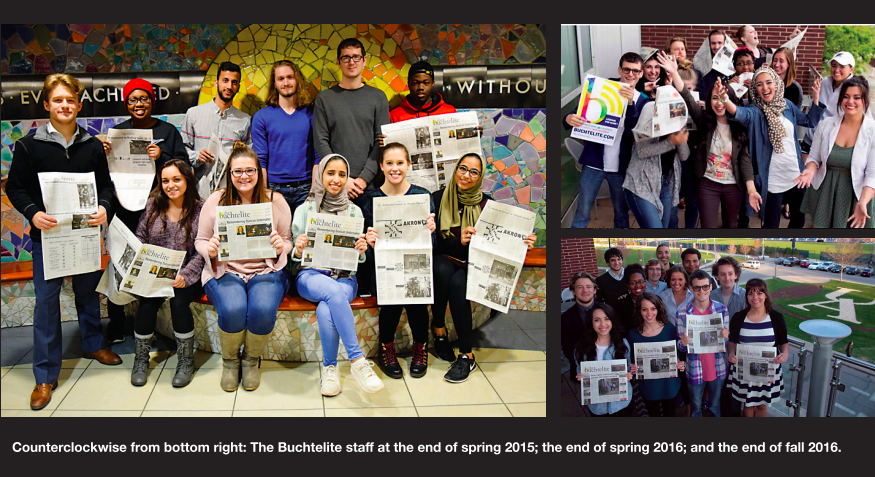“The day you thought would never come has arrived: My last byline. And through it all, you’ve listened. I’d like to think there are a few folks in the University of Akron administration who are glad to see me go. I’d like to think that, because I’d like to believe that I am a tenacious, truth-seeking bulldog of a journalist who makes people tremble at the sound of her name, but that’s probably not the case.”
“
The day you thought would never come has arrived: My last byline.
And through it all, you’ve listened.
I’d like to think there are a few folks in the University of Akron administration who are glad to see me go. I’d like to think that, because I’d like to believe that I am a tenacious, truth-seeking bulldog of a journalist who makes people tremble at the sound of her name, but that’s probably not the case.
Shoot.
Throughout my Buchtelite journey, I’ve had the unbelievably good luck to meet people from all walks of life. Through them, I’d like to think I’ve told compelling and important stories.
I was front and center during the most exciting presidential election I’d ever experienced. I saw Michael Moore twice that fall, once at Kent State and once on the UA campus, where he was invited by theater professor Susan Speers.
In conjunction with his brief visit here, days before Election Day, a busload of celebrities stopped on Market Street to meet with volunteers. Matt Dillon, Hillary Swank, Joe Napolitano (better known as Ralphie on The Sopranos) and Chad Lowe were among the group. Awesome.
Speers had already made headlines when she produced the all-black August Wilson play Fences in Guzzetta Hall. I was fortunate enough to catch an unbelievable performance with my son, which I reviewed for the Buchtelite.
Right before the election, I came face-to-face with Lila Lipscomb, the woman featured in Fahrenheit 9/11. Her son had been killed shortly after being deployed to Iraq.
As she thanked me for telling her story, she gave me what she called a Lila hug. I thought I should be the one hugging her, yet she felt the need to express her gratitude.
Several months before, I had spoken with another woman who had recently lost her son. Nursing professor Marie Cobb shared her feelings about the death of Steve Cobb, a student at UA, who died in a motorcycle accident.
You remember those kinds of moments, and the raw, gut-wrenching emotions that accompany them. They change you, and they change your perspective.
In the fall of 2004, I retold the account of the Black United Students takeover of Buchtel Hall.
That same semester, a professor in the department of public administration and urban studies was murdered in his Kent home. His killer was never caught.
Later that semester, I got a tip about an Ohio inspector general investigation. It led me to the office of vice president Ted Curtis. It turned out to be one of the best tips I have ever received.
The investigation turned out to be a red herring. But Curtis turned out to be a fascinating, amazing guy, so it all worked out.
Month after month, you listened to me as I explained the faculty union’s contract negotiations because we believed the situation was an important one for the university.
When tragedy struck me personally, I shared it with you. After my 27-year-old cousin died suddenly, I wanted to tell you his story. I did, and you listened.
Last spring, when the Akron Beacon Journal broke the Charles Plinton story, I tried to provide something different. I was able to share his story, through the eyes of his family, his mentors and city council member Marco Sommerville.
When a resident assistant was arrested for allegedly raping a woman in his dorm room, I sensed an opportunity. Not an opportunity for sensationalism or exploitation, but an opportunity to raise awareness and effect change. And that’s exactly what university administrators did. I don’t think that was our doing, but I’d like to think that we took part in the process.
When the SNOW Lady, Corky Calderone, passed away in March, I knew her death would have a huge impact. I took pride in being able to share her story with readers one last time, through the eyes of her colleagues.
It’s been quite an education.
Thanks for sticking with me through it all – even if you’ve hated me the entire time.
“

